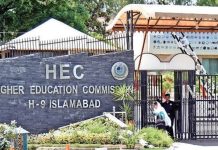Staff Report
ISLAMABAD: The three-day international conference on ‘Ijtihad bil Maqasid’ at Allama Iqbal Open University concluded on Friday with several recommendations.
These included establishing an institution to address and contemplate new emerging issues facing the Islamic world, conducting research in universities on various aspects of Ijtihad bil Maqasid, and performing Ijtihad considering Maqasid al-Shariah (objectives of Shariah) to tackle modern medical, economic, social, and cultural challenges.
Special guests at the concluding session included Justice Dr. Syed Muhammad Anwar from the Federal Shariat Court, Sahibzada Muhammad Qamar-ul-Haq, President of Jamia Muhammadi Sharif, Chiniot, and Professor Dr. Tufail Hashmi, former Dean of the Faculty of Arabic and Islamic Studies.
The session was moderated by Dr. Muhammad Riaz Mahmood. Professor Dr. Mohayyuddin Hashmi, Dean of the Faculty of Arabic and Islamic Studies, represented the Vice-Chancellor, Professor Dr. Nasir Mahmood.
Justice Dr. Syed Muhammad Anwar stated that holding a conference on Ijtihad bil Maqasid is a commendable initiative. He emphasized that Pakistan was established on the ideology of Islam and religion, and in terms of constitution and law, because its laws are made considering Islamic rules and regulations, and any laws conflicting with Shariah can be challenged in the Shariat Court.
He appreciated the suggestion of establishing an institution to ponder over new emerging issues, stating that the doors of the Shariat Court will always be opened for legal support and guidance.
Sahibzada Muhammad Qamar-ul-Haq remarked that Ijtihad is the wealth of Islamic thought, and new issues can only be resolved through Ijtihad. He expressed a desire to collaborate with universities to meet societal needs and stated that Jamia Muhammadi Sharif, Chiniot, is willing to play a role in establishment of the institution to advance the process of contemplation.
Expressing gratitude, Professor Dr. Mohayyuddin Hashmi mentioned that during the three days of the conference, in addition to the opening and closing ceremonies, eight parallel sessions, a plenary session, an online session, and a discussion forum was also held, where in-depth discussions on Ijtihad and contemporary Muslim society took place.



